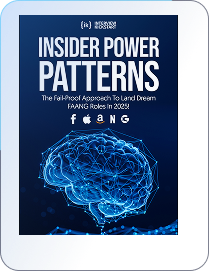Oracle is a multinational technology corporation that offers database management solutions, enterprise products, and cloud solutions. It was the second-largest software enterprise in 2020 in terms of market capitalization and revenue, making it a highly desirable company for developers and software engineers. The Oracle technical interview process is largely similar to processes at FAANG and other tier-1 companies. The interview rounds test your core coding and programming skills, besides evaluating your psychological and behavioral traits.
Oracle has an inclusive cultural environment that makes it one of the top places to work for engineers. Its decentralized culture, owing to the acquisition of several smaller companies, ensures the elimination of any unwelcome interference in the day-to-day operation of teams across the board.
Expert’s Quotes:
“When you innovate, you’ve got to be prepared for everyone telling you you’re nuts.”
–Lawrence Joseph Ellison
(co-founder and former CEO of Oracle Corporation)
In this article, we’ll look at some common interview questions asked at Oracle’s technical interview. We’ll also cover some tips to help you get past the various interview rounds and land an offer.
Here’s what we’ll cover:
Oracle essentially looks for polished problem-solvers with the ability to tackle modern-day problems through sound analytical skills. Problem-solving is a key skill that Oracle recruiters look for in tech interviews. So building your skills through diligent effort and persistent practice is extremely important to succeed in tech interviews at Oracle.
In a nutshell, here’s what Oracle looks for in software engineers or coding engineers who apply for engineering and developer roles:
You can solve tricky and complex problems: The coding interview requires you to solve tricky problems around core data structures and algorithms. Your ability to brute-force solutions and approach solutions from multiple angles to find the most optimal one is closely evaluated.
You exhibit the right attitude and demeanor: Behavioral interviews are an extremely important part of the technical interview process at big tech companies. It’s no different at Oracle, where your ability to adapt and your conduct in workplace-related situations is assessed. Hiring managers essentially look for candidates who display the right behavioral attitude and fit into the company’s culture.
Your distributed systems design concepts are strong: Your knowledge of distributed systems is extensively evaluated at Oracle’s on-site interview. Becoming thorough with systems design concepts is crucial if you crack the on-site interview at Oracle.

As mentioned earlier, the technical interview process at Oracle is largely similar to that at other tier-1 companies. Here’s what you can expect when you get shortlisted for Oracle’s technical interview:

The Initial Phone Screen: During the phone screen round, your skills and experience are assessed to see if you’re the right fit for the role. This is the initial interview round that takes place with a recruiter from human resources. Updating your LinkedIn profile with the right keywords is key to getting contacted for the initial phone screen.
The Technical Phone Screen: This is where your approach to problem-solving is evaluated before you’re invited to the on-site interview rounds. You can expect 1-2 coding problems of moderate difficulty. Your ability to brute-force the solution and write bug-free code to solve the problem is tested. You can also expect a few questions about your core technical skills and past employment experience.
The On-site Interview: On-site is where problem-solving skills are further tested. The on-site typically comprises a coding round, design round, and behavioral round. Senior developer positions are more focused on the design round, while junior positions focus more on the coding round. Behavioral rounds are important for all positions and typically carry more weight for senior developer and managerial positions.
The interview questions asked at Oracle’s tech interview can be classified into coding questions, design questions, and behavioral questions. Let’s look at some sample questions for each category.
Before getting into the questions, the following are the topics you should prepare for the coding interview. These topics feature in both the technical phone screen and the coding round in the on-site interview.

Here are some coding questions that are asked at Oracle’s coding interview:

For more problems and solutions, visit the Problems page.
Systems design is an important concept for the Oracle on-site. Here are the topics you should look to cover for your design interview:

Below are the type of design questions you can expect at Oracle’s on-site interview:
Recommended Reading:
Google Systems Design Interview Questions for Software Developers
Amazon System Design Interview Questions
Behavioral interviews are highly influential in hiring decisions. The purpose of behavioral interviews is to assess if you’re the right cultural fit. Here are some sample behavioral questions asked at Oracle’s on-site interview:
Mock interviews work! Don’t just take our word for it — check out these testimonials from Interview Kickstart alums who landed jobs at Oracle: Rajat Roy | Rohith Nedunuri
Recommended Reading:
Amazon Behavioral Interview Questions
Facebook Behavioral Interview Questions
9 Important Tips to Nail Coding Interviews in 2021
The types of questions asked in a typical Oracle interview are often of moderate level, which fluctuates from person to person. Because the number of interview rounds varies from four to seven, it can be scary for a candidate at times. But if you’re committed, it will be worthwhile. The quality of interview preparation determines whether the procedure appears easy or difficult. Glassdoor users rated their Oracle interview experience as 70.8% good, with a difficulty score of 3.10 out of 5.
The annual base pay of a Technical Leader at Oracle in the United States is approximately $159,054. This salary is 51% above the national average salary in the US. (Source: Indeed.com)
There are two stages to the interview procedure. There is a virtual assessment first, followed by a phone conversation from HR to verify whether you’re interested in the post, which usually lasts about 10 minutes. Finally, the hiring manager will conduct a technical interview with you.
Refrain from speaking over the interviewer, forgetting to express your thought process, memorizing solutions without grasping them, dismissing feedback, ignoring the value of soft skills, and forgetting to ask questions about the organization and role during a technical interview.
A functional interview determines how well an applicant’s abilities match the particular demands of a post, with emphasis on their capacity to accomplish tasks and bring value to the team. A technical interview, on the other hand, assesses an applicant’s skills in technical abilities and problem-solving, sometimes through coding tasks or technical issues.
Are you preparing for your next tech interview? Confused about where to start?
Let Interview Kickstart be your guide. As pioneers in the field of technical interview prep, we have trained thousands of software engineers to crack the toughest coding interviews and land jobs at their dream companies, such as Google, Facebook, Apple, Netflix, Amazon, and more!
To learn more, sign up for our FREE webinar on how to nail your next tech interview!
â€
Attend our free webinar to amp up your career and get the salary you deserve.

693+ FAANG insiders created a system so you don’t have to guess anymore!

100% Free — No credit card needed.

Time Zone:






Get your enrollment process started by registering for a Pre-enrollment Webinar with one of our Founders.

The 11 Neural “Power Patterns” For Solving Any FAANG Interview Problem 12.5X Faster Than 99.8% OF Applicants
The 2 “Magic Questions” That Reveal Whether You’re Good Enough To Receive A Lucrative Big Tech Offer
The “Instant Income Multiplier” That 2-3X’s Your Current Tech Salary

The 11 Neural “Power Patterns” For Solving Any FAANG Interview Problem 12.5X Faster Than 99.8% OF Applicants
The 2 “Magic Questions” That Reveal Whether You’re Good Enough To Receive A Lucrative Big Tech Offer
The “Instant Income Multiplier” That 2-3X’s Your Current Tech Salary
Just drop your name and email so we can send your Power Patterns PDF straight to your inbox. No Spam!
By sharing your contact details, you agree to our privacy policy.
Time Zone: Asia/Dhaka

We’ve sent the Power Patterns PDF to your inbox — it should arrive in the next 30 seconds.
📩 Can’t find it? Check your promotions or spam folder — and mark us as safe so you don’t miss future insights.
We’re hosting a private session where FAANG insiders walk through how they actually use these Power Patterns to crack interviews — and what sets top performers apart.
🎯 If you liked the PDF, you’ll love what we’re sharing next.
Time Zone:

